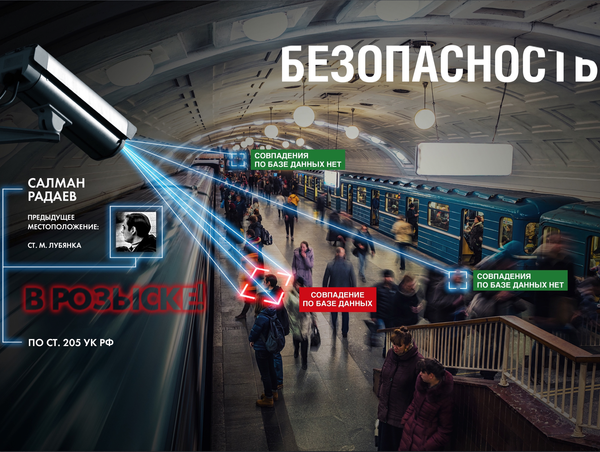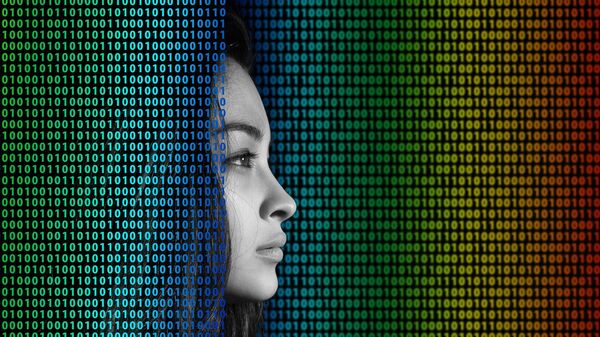On Thursday, the Financial Times reported, citing unnamed EU officials, that the bloc was going to introduce strict legislation to prevent "indiscriminate use of facial recognition technology’’ by companies and authorities. The new rules will purportedly give EU citizens the powers to know when their facial recognition data is used, with all exceptions "tightly circumscribed", according to the newspaper.
The initiative obviously comes as part of an overhaul planned by incoming European Commission chief Ursula von der Leyen in her first 100 days in office.
It also follows the commission's earlier decision to set up a High-Level Expert Group on the regulation of artificial intelligence (IA). In June, the group said that "new rules have to make clear when technologies were tracking targeted individuals or carrying out mass surveillance". It ruled that "practical means must be developed which allow meaningful and verified consent to be given to being automatically identified by AI or equivalent technologies."
Your Face Is Intensely Personal? Not Anymore!
Facial recognition is indeed rapidly becoming commonplace. Your face turns into your password, unlocking your smartphone, opening your office or your bank account. But the technology also has the power to track all your movements.
The prospect of living in a world where machines can follow your every move is worrying many, since it is an incredible invasion of privacy. It potentially limits freedom as not only the police or security services have use for facial recognition, but also shops that will identify you as you enter and see what you buy and learn your shopping habits. What is worse, your sensitive data may fall into the hands of fraudsters.
Such apps as FindFace, FaceSix or FaceFirst are made by the capacity of modern computers, with the technology becoming the most important application of artificial intelligence.
Faces on Twitter, Facebook and other social networks are "recognisable" and can be matched with reality on the street already. Surveillance of your life is thereby creeping up.
Europe Wants To Legislate
Asked about the Financial Times report, the European Commission confirmed that it was seeking "Europe-made, human-centric" approaches to artificial Intelligence.
"We are not going to comment on any leaked document. More generally, I would say that the issue is being addressed: the need to boost Europe-made, human-centric Artificial Intelligence", the deputy chief spokeswoman for the commission, Natasha Bertaud, said.
She also recalled that in June, "the High-Level Expert Group set up by the Commission issued a series of recommendations and advised the Commission to consider the need for new regulation, in particular when it comes to tracking and profiling, including facial recognition."
According to Bertaud, the measures are "now being tested," with the commission yet to decide on future steps, and the European Parliament to debate the issue.
Regulations In EU And US
Alexander Minin, the CEO of Moscow-based NtechLab, the world-leading company in the facial recognition segment, believes that the industry "needs clear and strict regulations, no doubt about that." Yet, he sees the issue as a "tricky" one, pointing to major differences in regulations existing in the United States – repeatedly rocked by surveillance scandals – and Europe.
"In the USA for example the procurement process has always been very flexible. The US was too early in the game, without quality standardisation. There may be false alarms, mistakes in the present systems installed. People are affected, so the US needs to be more strongly regulated," Minin stated.
The European Union, in contrast, is "too much regulated today." Facial recognition, meanwhile, can improve the security situation, strained by the migrant influx, and help struggling police forces, according to Minin.
"There is no way to abandon or avoid facial recognition. European cities will remain of the same size, but their population will grow, maybe 4 to 5 times. Quality of living will be higher than today. We will need the security systems in place but they will be heavily regulated to be sure they are in the right hands. The face recorded is only a digital image. It becomes a powerful tool when you also scan and record the ID photo of the person and can do matches. Without indexing, no interest", the expert explained.
Minin noted that the European Union has already in place the EU General Data Protection Regulation (GDPR), adding that NtechLab – which turned from a Russian start-up founded by two youngsters in Moscow into a leader in the sector – respects this legislation and has no problem with it.

Recently, however, a scandal occurred when Sweden’s national data protection authority slapped the first fine under GDPR on the Anderstorps high school in the city of Skelleftea after the latter installed a facial recognition camera for a trial period in one classroom in an attempt to make registration quicker. The parents had agreed, so had the students but the watchdog concluded that "the school’s facial recognition violated the GDPR by processing data in an overly intrusive way and processing sensitive personal data without a valid reason", while parents, being relied on the school, "could not freely give consent."
According to the Financial Times, the revelation about the use of facial recognition to monitor crowds in areas such as London’s King’s Cross has also prompted an investigation.
Police, Business As Potential Beneficiaries
Technology is, meanwhile, going further, with company NtechLab, for instance, now specialising in "silhouette recognition, not only facial anymore." According to Minin, cameras will now "pick up" a criminal, without the need to see his face, and follow him, "so the police will be able to track without efforts where the thief is heading."
"Let’s see it from another angle: the police force is costly and does not bring added value, so ideally, the ration policemen/general population should be as low as possible. We pay for the police force, so let’s minimise it. If they have the right tools, this can be done", he argued.
Another field of the AI development is activity tracking, according to the expert. New algorithms "can see if you are talking on the phone, texting, smoking, getting in a car with or without a package."
"It will be used in security developments, by detecting tracking any aggressive action in real-time, and in health care for example. Hospitals in developing countries ask us to control the actions taking place in the hospital; that the patients get their treatment. It can also help in process control; in the nuclear industry for example, where procedures must be strictly applied", Minin went on.
Facial recognition technology, he says, can be also used in medical diagnostics, albeit with "limitations."
New EU Commission Makes Digital Regulation A Priority
To harness digital technology in the interests of European citizens is also something the new European Commission is planning to do. In von der Leyen’s six-point "agenda for Europe," one point is dedicated to how to make the bloc "fit for the digital age." She also pledges to unveil legislation on the "human and ethical implications of artificial intelligence" in her first 100 days in office.
Diego Naranjo, a senior policy adviser at non-governmental organisation European Digital Rights, welcomes this initiative but is sceptical that the legislation could be worked out that quickly.
"Even if building on the work already done by the High-Level Expert Group working on AI, the Commission could possibly do, within this timeframe, all internal preparations, [but] public consultations and inter-service consultations necessary in order to formulate a meaningful and future-proof piece of legislation on this topic," Naranjo said.
Meanwhile, law professor Nicolas Denis from Belgium’s University of Liege believes the new legislation will not (and should not) try to regulate all aspects by one single piece of legislation.
"The Americans criticise us by finding that all legislation would be far too early. Good; the legislative engine of the EU is a diesel engine, it takes a warm-up time, it takes time ... But the assumption that it requires a single legislation that covers everything, as demanded by many in the civil society, is not good according to us. Holistic legislation is not the answer", he said.
The professor believes that the bloc needs to "work sector by sector, branch by branch and see which ones require legislation."
Like other experts, he noted that facial recognition brings "individual and collective risks" as well as opportunities, such as the use of it in medicine - distance therapy, symptom analysis and psychological counselling.
"We must not deprive our companies of new opportunities. The rules of governance, the fundamental rights that govern the EU are strong; we do not risk seeing a despot or an autocrat appear. Europe must remain firm on its principles", he concluded.
Data Protection VS Security
Many non-governmental organisations are ringing alarm about artificial intelligence, and in particular surveillance through facial recognition.
One of the German organisers of the digital freedom Netzpolitik Conference in Berlin slated for September, F. Ebelt, believes that freedom in the digitised world is essential and action is needed against "increasing surveillance."
"Now surveillance by companies and public authorities using facial recognition technology is not regulated at all, and public surveillance of European citizens is increasing at very high speed. It must be drastically limited, if it is not too late already", Ebelt said.
Germany’s Die Linke party similarly "calls for compliance and development of civil rights and freedoms in Europe, as well as common high data protection and data security standards for the commercial use and disclosure of data", Cornelia Ernst, a EU Parliament lawmaker from Die Linke, says.
"The Schengen Information System (SIS II), the Visa Information System (VIS) and the fingerprint database (EURODAC) store biometric facial images. These information systems are now to be gradually equipped with facial recognition technology for photo searches", Ernst stated.
She added that it was, however, unknown "how many facial images are already stored on the EU's SIS II, VIS and Eurodac databases, and how many of them are suitable for photo comparison, using the relevant software, in order to identify individuals." These issues are therefore yet to be answered by the bloc if it decides to harness the new technology.
Gilles Lebreton, France's National Front member of the European Parliament and a member of the committee that will legislate the use of facial recognition, believes that the technology has a potential to become an "effective weapon against terrorism and crime" and also has "great promises in medicine".
"It will, of course, be necessary to provide guarantees to avoid political excesses, but our commission knows how to guarantee that. Fortunately, the Committee on Legal Affairs escapes the grip of the extreme left, unlike the Committee on Liberties", he revealed.
Identifying Migrants
Identifying migrants is another area where facial recognition technology can be applied.
In May 2016, the EU-wide system of identification of migrant applicants (EURODAC) has made a plea to the European Commission to be allowed to collect more than just the fingerprints.
Massive migrant arrivals since 2015 have completely overwhelmed the fingerprinting facilities of many states. Tens of thousands of migrants remained invisible in Europe, a situation that facilitates irregular stay within the bloc.
EURODAC wanted to improve its fingerprint comparison evidence and asked the commission permission to store other biometric identifiers, such as facial recognition and the collection of digital photos.
But the fear of endangering the privacy of these people has paralysed the European Union. A spokesperson for the commission declared that "discussions are ongoing about applying facial recognition."
Theo Francken, a former Belgian state secretary for asylum and migration, argued that "collecting biographic data and using facial recognition are two key elements, to professionalise the work of EURODAC."
He therefore concluded that "there is a will to enable all illegals to get into Europe and to make controls as inefficient as possible," and expressed scepticism that von der Leyen was the person who would change the situation and enable the use of facial recognition for these purposes.
Views and opinions, expressed in the article do not necessarily reflect those of Sputnik.



